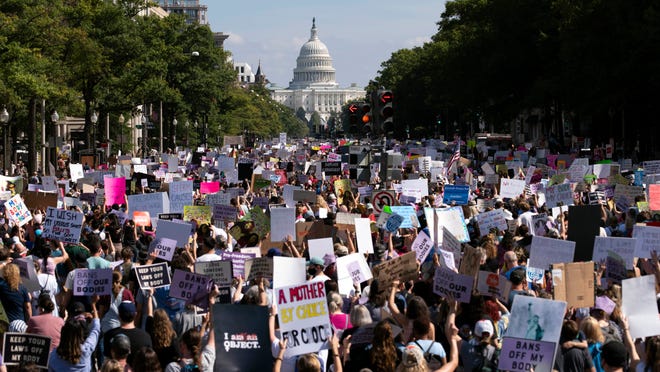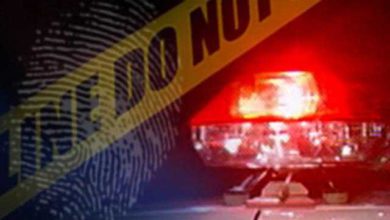
AUSTIN – A federal judge late Wednesday temporarily blocked enforcement of a Texas abortion law that effectively bans the procedure, delivering an early victory to the Biden administration in its legal challenge to the law.
In a 113-page ruling, U.S. District Judge Robert Pitman of Austin said the law is an "offensive deprivation of such an important right" and said state actors, including judges and court clerks, can no longer enforce its provisions.
"From the moment (the law) went into effect, women have been unlawfully prevented from exercising control over their lives in ways that are protected by the Constitution," Pitman wrote.
Republican Gov. Greg Abbott signed the legislation, known as the "fetal heartbeat" bill, into law in May — forcing the issue of reproductive rights back into the political spotlight. The law bans abortions once a fetal heartbeat is detected, usually around six weeks of pregnancy and before many people realize they are pregnant. There are no exemptions in cases of rape or incest.
Abortion providers say the legislation would restrict 85% of abortion procedures in Texas. The law is one of the most direct challenges on the boundaries of the U.S. Supreme Court's 1973 landmark Roe v. Wade decision that legalized abortion.
Similar six-week abortion laws in Georgia, Kentucky and other states have been blocked by federal courts.
But last month, the Supreme Court left the law to take effect. Over the objections of three liberal associate justices and Chief Justice John Roberts, the high court declined to block enforcement of the law in a 5-4 ruling.
Associate Justice Sonia Sotomayor called the decision "stunning," in a dissenting opinion joined by Associate Justices Stephen Breyer and Elena Kagan.
An explainer:What to know about Texas abortion law that bans the procedure once heartbeat is detected
Despite a federal court temporarily blocking enforcement Wednesday, the fight over the law — and abortion broadly — is far from over. Texas is likely to appeal the decision, and the legal fight could once again come before the U.S. Supreme Court depending on the ruling from an appeals court.
U.S. Attorney General Merrick Garland said in a statement the decision "is a victory for women in Texas and for the rule of law."
"It is the foremost responsibility of the Department of Justice to defend the Constitution," he said. "We will continue to protect constitutional rights against all who would seek to undermine them.”
Outcry over the law has thrust abortion back as a top issue ahead of the 2022 election, where control of Congress will once again be up for grabs. The U.S. House passed legislation late last month codifying the right to an abortion in response to Texas' law, though the bill's future in the U.S. Senate faces an uncertain path due to the 50-50 party split. Experts say the bill could be problematic for Republicans and go too far as public opinion polls show most Americans are in the middle on abortion.
This last weekend, protesters in cities across the country flocked to the streets to demand an end of the restrictive law. In Washington, D.C., a crowd of protesters gathered Saturday around a banner proclaiming "Bans off our bodies!" as Cyndi Lauper's "Girls Just Want to Have Fun" blasted from speakers. In Texas, Democrat Mike Collier, who is running for lieutenant governor, joined protesters, tweeting "men need to shut up, sit down, and listen."
It remains to be seen exactly how Pitman’s order will affect the availability of abortion in the state. As the law is drafted, abortion providers could still be liable for procedures performed while the law is temporarily blocked, assuming it is later allowed to go into effect.
Wednesday's preliminary injunction prevents judges or court clerks in the state from accepting lawsuits sanctioned by the ban and requires the state to publish a copy of the injunction on its public-facing court websites "with a visible, easy-to-understand instruction to the public that S.B. 8 lawsuits will not be accepted by Texas courts."
Pitman wrote in the ruling that it is clear "people seeking abortions face irreparable harm when they are unable to access abortions" and that temporarily blocking Texas' law from going into effect would allow abortions to proceed "at least for some subset of affected individuals."
Major abortion providers in the state had stopped offering procedures that could be in violation, citing the steep costs associated with successful litigation under the law as a deterrent.
After the ruling Wednesday, Nancy Northup, president and chief executive officer of the Center for Reproductive Rights, said that the clinics represented by her organization planned to resume operations soon, "even though the threat of being sued retroactively will not be completely gone until SB 8 is struck down for good."
"The cruelty of this law is endless," she said in a statement.
The Texas law was different from other restrictive abortion laws because instead of relying on officials to enforce it, private citizens were allowed to sue abortion providers and anyone involved in "aiding and abetting" abortions.
This could include anyone driving a person to an abortion clinic, among other situations. Anyone who is successful in suing is entitled to $10,000, according to the law.
Protests across the country:Hundreds of marches take place nationwide as protesters decry 'unprecedented attack' on reproductive rights
More:Texas doctor defies new state law and performs abortion past six weeks of pregnancy
Abortion rights advocates say the law is written in a way to prevent federal courts from striking it down, in part because it’s hard to know whom to sue.
Already, at least two lawsuits have been filed since the bill was made law. A Texas doctor was the target of one lawsuit after he penned an op-ed in The Washington Post stating he preformed an abortion on Sept. 6, five days after the law went into effect, and noted he could be sued for conducting the procedure.
"I fully understood that there could be legal consequences — but I wanted to make sure that Texas didn’t get away with its bid to prevent this blatantly unconstitutional law from being tested," Dr. Alan Braid of San Antonio said in the piece.
The Department of Justice said last month it would protect people's access to abortion in Texas despite the law and joined a lawsuit aiming to block the law. The Justice Department asked for an emergency court order blocking enforcement because Texas had "devised an unprecedented scheme that seeks to deny women and providers the ability to challenge (the law) in federal court," the filing said.
Garland issued a statement at the time saying the Justice Department would "continue to protect those seeking to obtain or provide reproductive health services pursuant to our criminal and civil enforcement" of a law known as the Freedom of Access to Clinic Entrances Act.
"The department will provide support from federal law enforcement when an abortion clinic or reproductive health center is under attack," Garland said. "We have reached out to U.S. Attorneys’ Offices and FBI field offices in Texas and across the country to discuss our enforcement authorities."
Mekelburg reported from Austin. Hayes reported from Los Angeles
Contributing: Mabinty Quarshie and Courtney Subramanian and Savannah Behrmann
Source link









